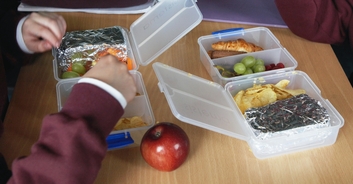In the age of information and technology we find ourselves in, unwillingly or not we are being influenced by the things we see and hear online. I'm not talking about the power of social media platforms to change the outcomes of past (and probably future) elections but the constant circus of ideas, products and services paraded across our screens in order to bait us to buy or sign up to something. One community this is very prominent in is influencers.
At its essence, an influencer is a pretty powerful entity but for this generation, the reality is that decisions an influencer is trying to (for lack of a better word) influence can hardly be considered benevolent - 20 percent off some sunglasses if you use the code #deedeefitness - I'm okay thanks. With all their influencing, influencers may be doing more harm than good, even in the realms of food.
According to a new study by Liverpool University, children who watched vloggers eat were indulging in more fatty and sugary foods.
This photo, in particular, maybe a bad example as salmon and coffee isn't the worst meal an influencer can push for you to have (it does help argue that even though this picture is aesthetically pleasing it does little to help promote the idea of healthy eating.
A lot of influencers use the aesthetic of health foods to only forward their own personal agenda - often one centered around free food and modeling contracts - that's another article altogether) but there are influencers out there, knowingly or not, pushing kids to eat unhealthy food.
Kids influenced by famous YouTubers consume 26 percent more calories than those who don’t watch them, the research found. Considering the popularity of mukbang, where presenters eat huge amounts of food, it might be time to check all the food content your child is watching.
Your kids might be addicted to the likes of Zoella or Alfie Deyes, and it could be doing them harm. The study, presented at the European Congress on Obesity, examined the responses of children to images from social media, using Zoella’s and Alfie’s channels. The study comes after calls for tougher rules were made on food advertising which may also encourage young people to eat unhealthily.
Unlike TV ads, YouTube content feels more like ‘real life’ so behaviours are subconsciously learned.
The 176 kids who took part in the study were split into three groups; one group who saw an influencer promote unhealthy snacks, one who promoted healthy food, and one who endorsed non-food products.
They were then offered a bunch of healthy and unhealthy foods including grapes, carrot sticks, chocolate buttons and jelly sweets. Those who watched unhealthy food content ended up eating 448 calories, while the others ate just 357. Dr Emma Boyland, one of the researchers, said YouTubers must be held responsible for this kind of effect. "They’ve earned a position of trust among young people and there has to be some responsibility along the line," she added.
Professor Russell Viner, president of the Royal College of Paediatrics and Child Health, said the government must implement more regulations to protect children against obesity influences. "It’s vital that children are protected from the marketing of junk food, not only on TV but also online where they are increasingly spending time," he said.
"Companies are able to target their adverts on social media, which does provide the opportunity for regulators to put restrictions in place." I am all for sharing the love for food but I don't need a 14-year-old telling me Jaffa Cakes are cool.

